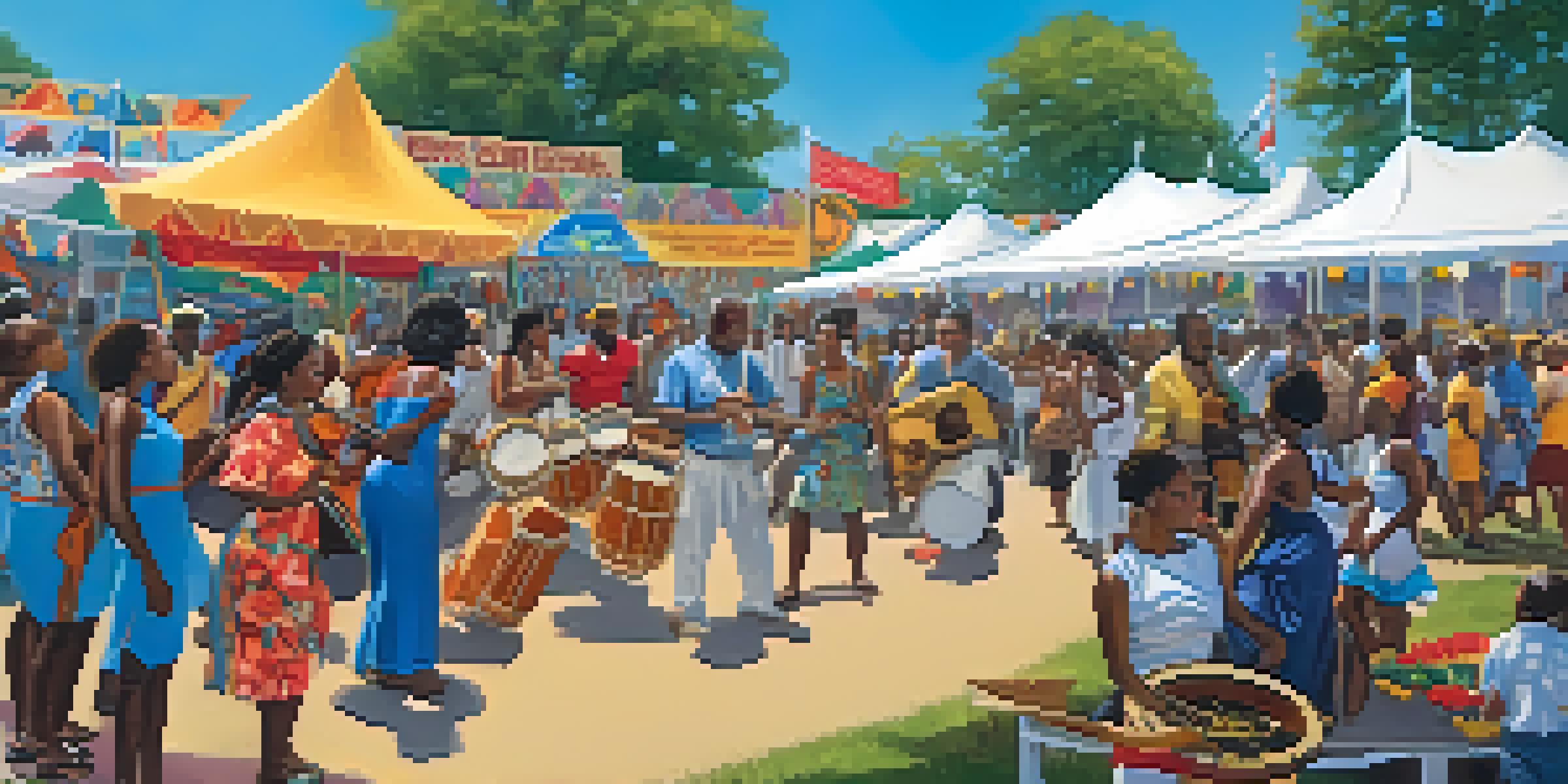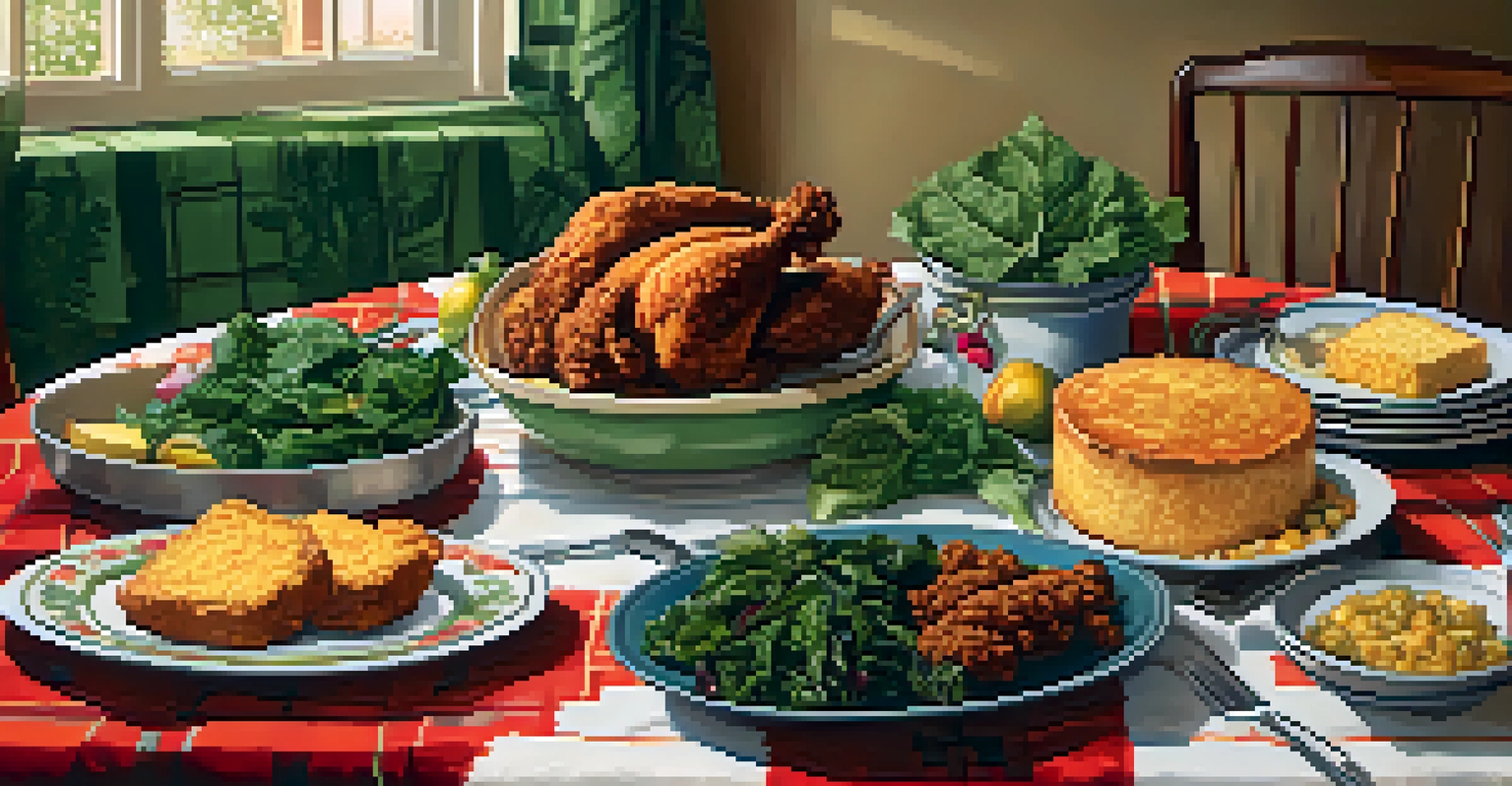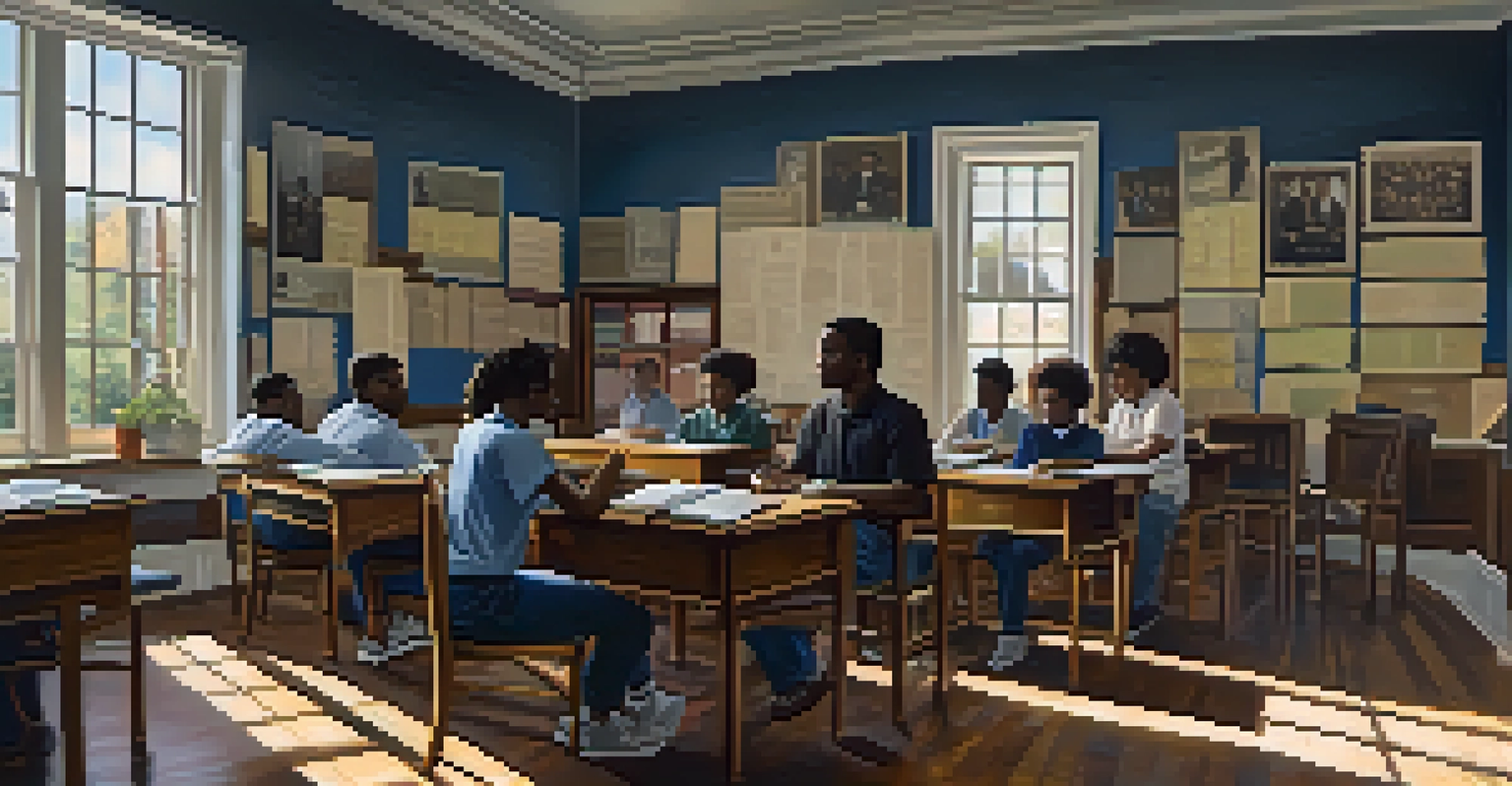The Influence of African American Culture in North Carolina

Historical Roots of African American Culture in NC
The history of African American culture in North Carolina is deeply intertwined with the state’s past. From the arrival of enslaved Africans in the 1600s, their rich traditions began to blend with local customs, laying the groundwork for a vibrant cultural identity. This legacy is evident in the music, art, and social customs that continue to flourish today.
The history of African American culture is a narrative of resilience, creativity, and profound contributions that continue to shape our identity.
As the years progressed, African Americans contributed significantly to the agricultural landscape, notably through the cultivation of crops like tobacco and cotton. This labor was not just about work; it was a means of preserving and passing down cultural practices. Many traditions, such as storytelling and folk art, emerged as a way to maintain a sense of community and heritage.
The Civil Rights Movement further shaped African American culture in North Carolina, as activists fought for equality and justice. Leaders like Dr. Benjamin Chavis and the Greensboro Four sparked significant change, highlighting the importance of collective action. These historical moments continue to resonate, influencing contemporary cultural expressions across the state.
The Vibrant Music Scene Influenced by African American Culture
Music has long been a powerful form of expression within African American communities in North Carolina. Genres such as jazz, blues, and gospel have roots deeply embedded in the state's history. This musical heritage not only reflects the struggles and triumphs of African Americans but also serves as a vital link to their ancestors' experiences.

North Carolina is home to iconic festivals, like the North Carolina Black Film Festival and the National Black Theatre Festival, showcasing the artistic talents of African Americans. These events highlight the importance of music in storytelling, bringing together diverse audiences to celebrate cultural achievements. Additionally, venues across the state host live performances that keep these musical traditions alive.
Cultural Roots in North Carolina
African American culture in North Carolina has deep historical roots that blend traditions from enslaved Africans with local customs.
One notable example is the influence of the Piedmont blues, a genre that evolved in the early 20th century. Artists such as Blind Boy Fuller and Elizabeth Cotten originated from this region, showcasing the unique sounds and styles that emerged from their experiences. Their contributions have had a lasting impact on the music industry, inspiring countless musicians today.
Culinary Influences: A Taste of African American Heritage
The culinary landscape of North Carolina is a delicious testament to African American culture. Dishes like fried chicken, collard greens, and cornbread have roots in African traditions, adapted over generations to create a unique Southern cuisine. These meals are often prepared during family gatherings and celebrations, emphasizing the importance of food in fostering community.
Music is a way of healing, a way of connecting with our ancestors, and a way of celebrating our culture.
Barbecue is another culinary hallmark of North Carolina, with its distinct styles and flavors. African American pitmasters have played a crucial role in developing these barbecue traditions, blending techniques from their heritage with local ingredients. This fusion has made North Carolina a hotspot for barbecue lovers, showcasing the cultural significance of food in the region.
Moreover, the tradition of storytelling often accompanies meals, as families share anecdotes and history around the dinner table. This practice not only preserves cultural narratives but also strengthens family bonds. The act of cooking and sharing food becomes a celebration of heritage and a way to honor ancestors.
Artistic Expression in African American Communities
Art has always been a powerful medium for African Americans in North Carolina to express their identity and experiences. From visual arts to literature, African American artists have made significant contributions that reflect their unique perspectives. This artistic expression serves as a form of resistance, celebration, and storytelling.
Local artists such as John Biggers and Willie Ray Baptiste have gained recognition for their work, often drawing inspiration from their cultural heritage. Their pieces often explore themes of identity, struggle, and resilience, resonating with audiences both locally and beyond. Galleries and exhibitions across the state continue to showcase African American art, fostering a deeper appreciation for these creators.
Music as a Cultural Expression
Genres like jazz, blues, and gospel highlight the profound influence of African American music on North Carolina's cultural identity.
Furthermore, creative writing has flourished within the community, with poets and authors like Maya Angelou and Nikki Giovanni drawing on their experiences in North Carolina. Their works provide insight into the complexities of African American life, often addressing social issues and celebrating cultural pride. This literary legacy continues to inspire new generations of writers.
The Role of Education in Preserving African American Culture
Education plays a vital role in preserving African American culture in North Carolina. Historically Black Colleges and Universities (HBCUs) like North Carolina Central University and Fayetteville State University are key institutions that promote cultural awareness and heritage. These schools not only provide educational opportunities but also serve as hubs for cultural events and discussions.
Curricula at HBCUs often include courses on African American history, literature, and art, helping students connect with their heritage. This educational focus empowers students to appreciate their culture while fostering leadership skills to advocate for social change. Moreover, community organizations offer programs that engage younger generations in cultural preservation.
Initiatives like cultural festivals and history projects encourage participation and collaboration, creating a sense of pride among community members. By actively engaging with their history, individuals can better understand their roots and contribute to the ongoing narrative of African American culture in the state.
The Impact of African American Culture on North Carolina Identity
African American culture has significantly shaped the identity of North Carolina, creating a rich tapestry of traditions and practices. This influence is evident in everything from music and food to festivals and community gatherings. The blending of African American culture with other traditions has fostered a unique and inclusive identity for the state.
Public events like the North Carolina Black Heritage Festival celebrate this cultural diversity, highlighting the contributions of African Americans to the state's heritage. These gatherings provide a space for sharing stories, enjoying traditional foods, and appreciating the arts, reinforcing the importance of cultural exchange. Through these celebrations, the state acknowledges its diverse roots.
Education Preserves Heritage
Historically Black Colleges and Universities play a crucial role in promoting African American cultural awareness and preserving heritage through education.
As North Carolina continues to evolve, the influence of African American culture remains a vital part of its identity. From the arts to politics, African Americans have played a crucial role in shaping the state's narrative, ensuring that their voices and experiences are recognized and valued.
Continuing Legacy: Modern Expressions of African American Culture
Today, African American culture in North Carolina continues to thrive and evolve, reflecting the changing dynamics of society. Artists, musicians, and writers are pushing boundaries and exploring new themes that resonate with contemporary audiences. This ongoing creativity showcases the resilience and adaptability of African American culture.
Social media platforms have also become vital tools for modern expression, allowing artists to reach wider audiences and share their work. Whether through music, visual arts, or spoken word, African Americans in North Carolina are utilizing technology to highlight their narratives and connect with others. This digital engagement is crucial for maintaining cultural relevance.

Furthermore, community initiatives are fostering collaboration among artists and cultural leaders to ensure the preservation of their heritage. Programs that encourage mentorship and support emerging talents are vital for passing down traditions and experiences. This commitment to cultural continuity ensures that the influence of African American culture will remain strong for future generations.